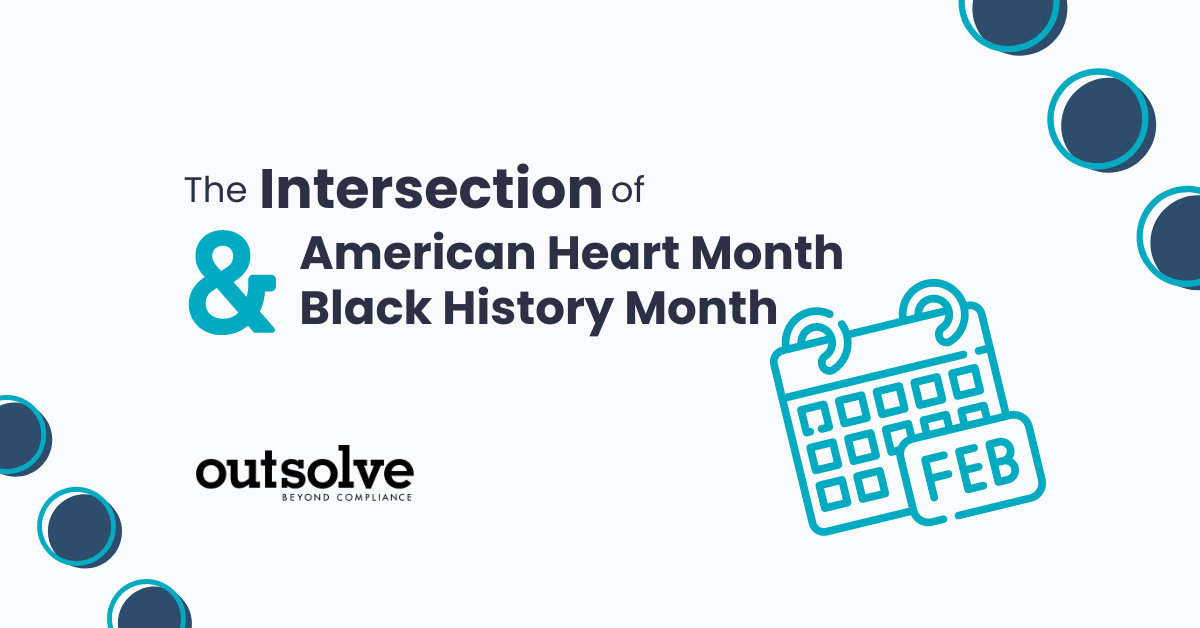OutSolve’s EEO colleague, Toni Ahl, is an occasional contributor to our blog. The views, thoughts, and opinions expressed in this article belong solely to Toni and do not necessarily reflect the viewpoint of OutSolve or its employees.
February is American Heat Month. February is also Black History Month. So, how are these topics related? And, how are they connected to the laws enforced by the Equal Employment Opportunity Commission?
According to the U.S. Department of Health and Human Services Office of Minority Health, African Americans were 30% more likely to die from heart disease than non-Hispanic whites. It is important to note that African American adults are 30% more likely to have high blood pressure compared to non-Hispanic whites, but unfortunately, they also face challenges in effectively managing their blood pressure. The likelihood of African American women having high blood pressure is over 50% higher compared to non-Hispanic white women.
As we can see, there are disparities in the rates of heart disease and high blood pressure between African Americans and the non-Hispanic white population. The disparity in high blood pressure control is even more pronounced among African American females compared to their non-Hispanic white counterparts.
The EEOC enforces the Americans with Disabilities Act of 1990, as amended, (ADA). The ADA prohibits discrimination based on physical or mental impairments that substantially limit any major life activities. There are three primary ways for an employee or applicant to have coverage under the ADA. Employees may qualify for coverage if their impairment is substantially limiting, if they have a record of such a substantially limiting impairment, or they are regarded as having such an impairment. The ADA considers how impairment affects the individual without considering mitigating measures such as medications. The ADA requires the person to be otherwise qualified for their position and be able to perform the essential functions of the job with or without a reasonable accommodation.
So, if someone has high blood pressure that substantially limits any of their major life activities, they could be an individual with a disability. If their prescribed medication controls their high blood pressure, they may not be limited in any major life activity. However, if the medication they are taking ceases to control their high blood pressure and their doctor changes their medication, they may need be accommodated until the new medication can be regulated. It is incumbent on the employee or applicant to notify the employer of their need for a reasonable accommodation unless the disability is observable. Can you look at someone and see that they have high blood pressure? That is very doubtful.
An employee may have heart disease that substantially limits one or more of their major like activities but that can be remediated by surgery or a medical procedure. If they undergo the procedure and it resolves the issue so that they are no longer substantially limited in a major life activity, they may still have coverage under the ADA and need to be accommodated. This accommodation could be time off for follow-up doctor visits. This person would be considered to have a record of a disability.
Based on the statistics cited above, we see that high blood pressure as well as heart disease has more of an impact on African American employees and applicants than on non-Hispanic whites. It may also indicate that more African American employees and applicants may need accommodations under the ADA for blood pressure or heart issues.
If you have questions about the ADA or any of the statutes enforced by EEOC, feel free to reach out to me at eeoadvantage@gmail.com or (502) 553-7648.
President at EEO Advantage, LLC
Recent Posts

Salaries are No Longer Secret – The Pay Transparency Revolution
Related Posts

What Triggers an I-9 Audit? Key Factors You Should Know
Verifying proper identity and work authorization documentation for every employee is a crucial HR compliance function - not just for a company’s...

Part 2: Actions Federal Contractors and Grantees Should Take Now to Certify Their Federal Contracts & Grants
OutSolve has invited John C. Fox, Esq. as a guest blogger providing legal insights on EEO and compliance issues. The views expressed in his posts are...

How to Conduct Compliant and Non-Discriminatory Interviews
Interviewing applicants is a crucial part of the hiring process. To ensure your organization is staffed with top performers, you must begin by...
 Toni Ahl
Toni Ahl


